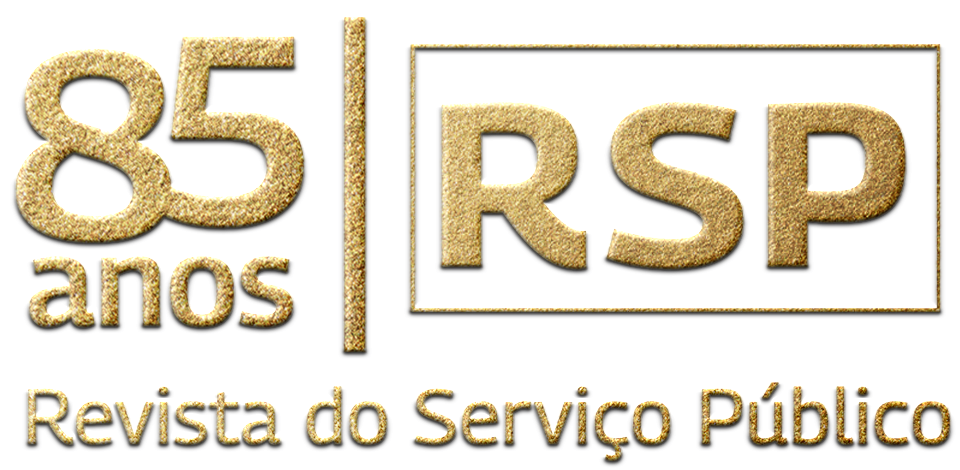Collaborative governance for research in health:
implications from analysis of the Research Program for the Unified Health System
DOI:
https://doi.org/10.21874/rsp.v71ic.4649Keywords:
Collaborative Governance, Science, Technology and Innovation Policy, Research for the Brazilian Unified Health System ProgramAbstract
The present study seeks to answer, how collaborative governance occurs in the scope of the Research Program for SUS: Shared Health Management (PPSUS), in three Brazilian states, with the purpose of point out the limits and potentialities of the theoretical model of Ansell and Gash (2008), one of the most applied models available in the literature on the topic to understand this type of phenomenon. For that, it uses a qualitative method, case study procedures, with documentary analysis and field interviews in the three selected states. It concludes that the process of collaborative governance within the scope of the PPSUS in the three analyzed states occurs in an incomplete way, dispite of the collaborative design of the program and the existence of joint decisions. The implementation of actions is limited by the resources, knowledge and processes available in each organization participating in the Program. This means that these elements strongly influence the collaborative process, a finding from which it is proposed to include in the model a category called “intraorganizational management capacity”.
Downloads
References
AGRANOFF, R.; MCGUIRE, M. Collaborative public management: new strategies for local governments. Washington, DC: Georgetown Univ. Press., 2003.
ALBUQUERQUE, E.; CASSIOLATO, J. As especificidades do sistema de inovação do setor saúde. Revista de Economia Política, v. 22, n. 4, p. 134-51, 2002.
ANSELL, C.; GASH, A. Collaborative governance in theory and practice. Journal of Public Administration Research and Theory, v. 18, n. 4, p. 543-71, 2008.
ARRETCHE, M. Financiamento federal e gestão local de políticas sociais: o difícil equilíbrio entre regulação, responsabilidade e autonomia. Ciência & Saúde Coletiva, v. 8, n. 2, p. 331-45, 2003.
BARDIN, L. Análise de conteúdo. São Paulo: Edições 70, 1979.
BRASIL. Ministério da Saúde. Secretaria de Ciência, Tecnologia e Insumos Estratégicos. Departamento de Ciência e Tecnologia. Informes Técnicos. Descentralização no contexto do fomento à pesquisa em saúde. Revista Saúde Pública, v. 45, n. 3, p. 626-30, 2011.
BRASIL. Ministério da Saúde. Secretaria de Ciência, Tecnologia e Insumos Estratégicos. Departamento de Ciência e Tecnologia. Programa Pesquisa para o SUS: gestão compartilhada em saúde – Diretrizes Técnicas – 5. ed – Brasília: Ministério da Saúde, 2014.
CRESWELL, J. W. Projeto de pesquisa: métodos qualitativo, quantitativo e misto. 2. ed. Porto Alegre: Artmed, 2007.
EMERSON, K.; NABATCHI, T.; BALOGH, S. An integrative framework for collaborative governance. Journal of Public Administration Research and Theory, v. 22, n. 1, p.1-29, 2012.
GUIMARÃES, R. Bases para uma política nacional de ciência, tecnologia e inovação em saúde. Ciência e Saúde Coletiva, v. 9, n. 2, abr.-jun., p. 375-88, 2004.
GUIMARÃES, R. Pesquisa em saúde no Brasil: contexto e desafios. Revista de Saúde Pública, São Paulo, v.40, n. esp., p. 3-10, 2006.
KETLL, D. F. Managing boundaries in american administration: the collaborative imperative. Public Administration Review, v. 66, p. 10–19, 2006.
LAVILLE, C.; DIONNE, J. A construção do saber: manual de metodologia da pesquisa em ciências humanas. Porto Alegre: Artmed; Belo Horizonte: Editora UFMG, 1999.
MCGUIRE, M. Collaborative public managment: assessing what we know and how we know it. Public Administration Review, v. 66, p. 33–43, 2006.
MARTINS, H. F.; MARINI, C. Governança pública contemporânea: uma tentativa de dissecação conceitual. Revista do TCU, n. 130, p. 42-53, 2014.
O´LEARY, R; VIJ, N. Collaborative public management: where have we been and where are we going? The American Review of Public Administration, v. 20, n. 10, p. 1-16, 2012.
OSTROM, E. Governing the commons: the evolution of institutions for collective action. Cambridge: Cambridge Univ. Press, 1990.
PECI, A.; PIERANTI, O.; RODRIGUES, S. Governança e new public management: convergências e contradições no contexto brasileiro. Organizações e Sociedade, v. 15, p. 39–55, 2014.
PETERS, B. G.; PIERRE, J. Governance without government? Rethinking public administration. Journal of Public Administration Research and Theory, v. 8, n. Rhodes 1997, 1998, p. 223–43.
PRESSMAN, J. L.; WILDAVSKY, A. B. Implementation: how great expectations in Washington are dashed in Oakland. California: University of California Press, 1973.
SCHWARTZMAN, S. A pesquisa científica e o interesse público. Revista Brasileira de Inovação, v. 1, n. 2 jul./dez., p. 361-95, 2002.
STOKER, G. Governance as theory: five propositions. International Social Science Journal, v. 50, n. 1, p.17-28, 1998.
TANG, S. Y.; MAZMANIAN, D. A. Understanding collaborative governance from the structural choice: politics, IAD, and transaction cost perspectives. 2010. Disponível em: <http://www.ssrn.com/abstract=1516851>. Acesso em: 24 jan. 2017.
Downloads
Published
How to Cite
Issue
Section
License
Copyright (c) 2020 Revista do Serviço Público

This work is licensed under a Creative Commons Attribution-NonCommercial-ShareAlike 4.0 International License.
- A RSP adota a licença Creative Commons (CC) do tipo Atribuição – Uso Não-Comercial (BY-NC).
- A licença permite que outros remixem, adaptem e criem obra licenciada, sendo proibido o uso com fins comerciais.
- As novas obras devem fazer referência ao autor nos créditos e não podem ser usadas com fins comerciais, porém não precisam ser licenciadas sob os mesmos termos dessa licença.
- Ao publicar o artigo na RSP, o autor cede e transfere para a ENAP os direitos autorais patrimoniais referentes ao artigo.
- O artigo publicado na RSP não poderá ser divulgado em outro meio sem a devida referência à publicação de origem.
- O autor que tiver o artigo publicado na RSP deverá assinar o Termo de Concessão de Direitos Autorais (em momento oportuno a editoria da Revista entrará em contato com o autor para assinatura do Termo).



